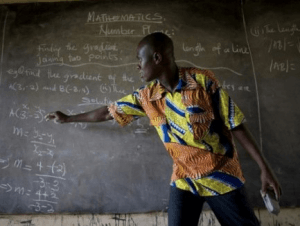National Teacher Policy development underway in Accra
 The Ministry of Education, the National Teaching Council (NTC) and UNESCO are facilitating the development of a National Teacher Policy (NTP) towards providing political leadership and policy direction for addressing challenges in the Teaching profession.
The Ministry of Education, the National Teaching Council (NTC) and UNESCO are facilitating the development of a National Teacher Policy (NTP) towards providing political leadership and policy direction for addressing challenges in the Teaching profession.
The policy, when developed, is expected to help in addressing policy dimensions in the areas of teacher recruitment and retention; initial and continuing teacher education; deployment; career structure; teacher employment and working conditions; as well as teacher reward and remuneration among others.
The National Policy development is part of the initiative: “Strengthening Multi-Partner Cooperation to Support Teacher Policy and Improve Learning” developed by UNESCO and the International Task Force on Teachers for Education 2030 in collaboration with six international partner organisations.
The initiative, christened the Norwegian Teacher Initiative (NTI) and funded by the Norwegian Government, aims at selected developing countries in Africa in strengthening their teacher policies as integrated components of their education sector plans for the achievement of the teacher target of the Sustainable Development Goals – Goal 4.
Opening the three-day multi-partner forum on Tuesday, Dr Mathew Opoku-Prempeh, the Minister for Education said every child has strengths and their own unique talents, noting that for some, it could take time to reveal them and dedication to nurture them adding that central to this was the teacher.
He said the best teachers equipped younger ones for life ahead with the practical skills needed to survive and the communication skills needed to thrive in the adult world.
Dr Opoku-Prempeh said the Akufo-Addo administration’s resolve to improve the issues on teachers for better output has resulted in prioritising the discussions on teachers in the development agenda.
He said the country’s involvement in the NTI had helped the nation to take stock of the many things the country was doing for teachers adding that the initiative is expected to motivate teachers to give off their best in shaping the future of children.
The sector Minister said the collective spirit in developing the NTP would be followed by a collective approach towards implementation and urged all stakeholders to bring on board their peculiar expertise and resources to salvage the critical issues of teachers.
He said some of the critical issues that needed to be addressed include teacher absenteeism, low teacher time on task, inappropriate conditions of work for teachers, deployment-related issues, concentration and understaffing of teachers.
Mr Christian Addai-Poku, the Acting Executive Secretary of the NTC, said studies has shown that the development of education depended largely on teachers, which led to the introduction of the SDGs Goal 4c.
He said the SDGs emphasised the need to have good training for teachers, providing them with employment and encouraging them to stay and work for the progress of the sector because training teachers for them to leave the job in two or three years does not augur well for the sector.
Madam Anne-Claire Dufay, the UNICEF Country Representative, said the right to education is particularly important because it paves way for the future of children adding that education was essential to the work of UNICEF.
She commended the Ministry of Education and all stakeholders for the steps already taken to improve on the quality of education in the country by setting teacher standards, revising the teacher education curriculum, and introducing a new peculiar special degree among others.
She said the UNESCO was delighted that the Ministry had taken up the Norwegian Teacher Initiative to join the global partnership to develop the NTP in Ghana, noting that it was critical to the improvement of education.
Source: GNA
